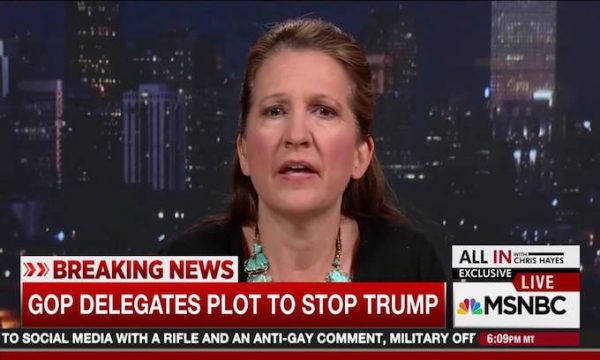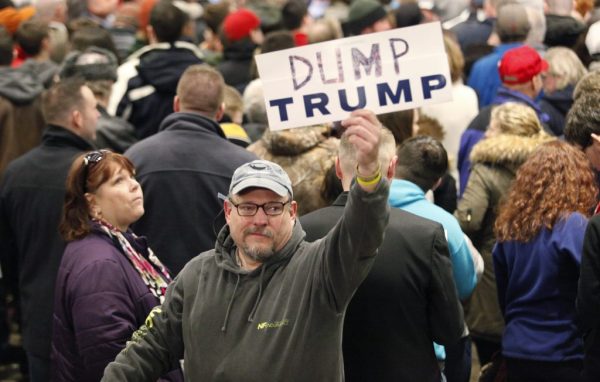
The “Never Trump” movement’s last stand begins Thursday morning in the basement of the Cleveland Convention Center.
That’s where the Republican National Convention’s Rules Committee will meet Thursday and Friday to debate and approve the guidelines that will govern how GOP delegates nominate their presidential and vice presidential candidates.
As Donald Trump cut a path through the Republican primary field this spring, various groups of conservative activists worked to deny him the 1,237 delegates he needed to clinch the party’s nomination on the first ballot in Cleveland. But after a string of Trump victories in the Northeast and Indiana forced Ted Cruz and John Kasich out of the race, that effort died.
Trump cleared that hurdle shortly before the last round of primaries. Some 1543 delegates are set to vote for Trump when balloting begins Monday.
That is, unless a collection of anti-Trump groups pulls off a long-shot bid this week that would be more at home in one of those ragtag-lovable-underdogs sports movies than at a political convention.
The goal of groups like “Free The Delegates” and “Delegates Unbound” is to get the convention to adopt rules that allow delegates to “unbind” themselves from Trump, and presumably nominate a different candidate.

Among hurdles standing in their way:
- The Republican Party and Trump campaign hold significant clout within the 112-member rules committee
- Ditching a nominee who earned the backing of millions of voters — more than any previous Republican candidate — would alienate scores of GOP voters.
- The anti-Trump coalition doesn’t even have an alternate candidate to present to the convention.
Those odds aren’t swaying Kendal Unruh, the Colorado delegate who’s emerged as the face of the convention’s “Never Trump” forces.
Unruh teaches government at a small Christian high school. In Cleveland, she leaned against the wall of the sparse offices the “Delegates Unbound” group has rented near the convention. She said she’s lost track of the amount of interviews she’s done in recent days.
Unruh has been a conservative activist for decades, and she supported Ted Cruz during the primary. She, like other anti-Trumpers, insists RNC delegates already have the right to vote against their states’ primary results.
“A primary vote is not a primary vote, and I’m sorry that you’ve had school curriculum that taught that,” she said. “It’s a preference poll.”
But Unruh conceded that most Republicans are “rule-followers.” So she’s pushing the Rules Committee to adopt language that would clearly allow delegates to vote for any nominee they like, if they say a Trump vote would violate their conscience.
Here’s how things will go down this week: The convention’s rules committee meets Thursday and Friday. That’s where Unruh will make her proposal.
The Trump campaign and the Republican party obviously don’t want it to pass, since that would unbind delegates who are otherwise obligated to vote for Trump.
Unruh said she knows the committee will vote her proposal down. But when it does, she can file what’s called a “minority report.”
“And I just take that to the chairman,” she said. “And I’m going to make sure I take it to the secretary, and the treasurer, and their dog, just to make sure everything’s covered.”
When that happens, she’d need the support of just 28 committee members for the proposal be sent to the full convention for a vote next week.
That’s where Unruh’s ally, Dane Waters, comes in. His “Delegates Unbound” group is working to whip up support for a ditch-Trump effort among the convention’s 2,472 delegates. “We’re emailing them, we’re calling them,” he said.
Waters said they’ll be texting out real-time instructions to delegates during the floor proceedings. “We have parliamentarians who are involved in this effort. Who will come in and say, we need to object here, we need to object here.”
So say this actually works — that the dog catches the car and, suddenly, enough delegates have voted for the new language that the convention can ditch Trump.
There are a couple problems.
Telling millions of primary voters to take a hike would fly in the face of decades of precedent. Party presidential nominations might have initially been party and delegate decisions but, over the past century, they’ve become more and more democratic and reflective of, if not necessarily bound to, national primary processes.
Waters dismissed that. “People want to talk about, ‘Oh, the will of the people have spoken,” he said. “Well, let’s talk about that. Donald Trump received only 46 percent. 54 percent of Republicans who voted said they did not want Donald Trump, i.e., he did not get a majority, OK?”
But it’s delegates, not votes, that matter. And Trump won a clear majority of delegates this year.
The second problem is more practical, as Unruh acknowledged. “We’re running a campaign without a presidential candidate, against a presumptive nominee,” she said.
So it appears the odds of all of this falling into place are pretty low.
But Unruh and Waters are confident. In separate interviews, they both quoted one of those underdog sports movies — Field of Dreams — saying: “If you build it, he will come.”
NPR

Leave a Reply
You must be logged in to post a comment.